Chartered Accountant (CA) is a designation given to accounting professionals in many countries around the globe, excluding the United States. A Chartered Accountant has completed the required academic and practical training designed by the relevant professional body and is qualified to provide a range of advanced financial advice, including audit, financial reporting, taxation, and more. On the other hand, a Certified Public Accountant (CPA) is a designation for qualified accountants in the United States who have passed the Uniform Certified Public Accountant Examination and met other state requirements. CPAs provide various financial services, including tax preparation, financial planning, and audit services. The role of a Chartered Accountant and a Certified Public Accountant is crucial in their respective domains. Both professionals provide the underpinning for financial operations, stability, and growth for businesses and individuals alike. Chartered Accountants have a comprehensive understanding of business and finance and contribute to strategic decision-making processes. Their understanding of tax law and finance makes them indispensable to businesses looking for tax planning, financial forecasting, and risk management. Certified Public Accountants are equally important and offer a range of services, including auditing, consulting, tax advice, and financial management. CPAs ensure adherence to tax laws and financial regulations, assist with tax returns, and provide advice on financial planning. Chartered Accountants perform various roles depending on their employment context. These roles may include conducting audits, providing tax advice, managing corporate finance, and offering consultation services. They are involved in key strategic decisions and risk management for businesses. Certified Public Accountants also have multifaceted roles. They provide auditing services, tax preparation, financial planning advice, and consultation services. CPAs can work for corporations, non-profit organizations, or individuals, providing tailored financial advice. To become a Chartered Accountant, one must complete a degree, join a relevant professional body, and undergo a period of practical training. This process varies from country to country, and the governing body in each jurisdiction sets specific requirements. For a Certified Public Accountant, one must first have a bachelor's degree and complete 150 hours of higher education. After this, they must pass the Uniform CPA Examination. Additionally, experience in the field is a common requirement before licensure is granted. A Chartered Accountant brings a wealth of knowledge and expertise in various areas, including tax, finance, business strategy, and audit. They have a comprehensive skill set that makes them an asset for any business seeking strategic financial advice. Similarly, a Certified Public Accountant possesses a broad base of knowledge and practical skills in auditing, tax, financial reporting, and consulting. They can help businesses navigate complex tax laws and ensure compliance with financial regulations. Chartered Accountants are recognized worldwide, making them an asset to multinational corporations. Their knowledge and skills are transferable across different financial landscapes. Certified Public Accountants are primarily recognized in the United States, but their skills and knowledge are also respected globally. Many countries recognize the CPA qualification, and CPAs can often transfer their skills to different financial environments. Both Chartered Accountants and Certified Public Accountants undergo a rigorous certification process. For Chartered Accountants, this involves a series of professional exams, practical experience, and ongoing professional development. For Certified Public Accountants, the certification process includes meeting higher education requirements, passing the Uniform CPA Examination, and acquiring professional experience. The CPA Exam is known for its rigor and demands a deep understanding of various areas of finance and accounting. Chartered Accountants face challenges such as keeping up with changes in financial regulations, managing risk, and staying ahead in a rapidly evolving financial landscape. They must also uphold the highest ethical standards in their practice. Certified Public Accountants face similar challenges. In addition to regulatory changes and ethical considerations, CPAs must maintain their professional competency in a rapidly changing business world. Understanding your financial needs is crucial when choosing between a Chartered Accountant and a Certified Public Accountant. You should consider your business's size, nature, and location, as well as the complexity of your financial transactions. It's also essential to review the expertise of the professional. While both CAs and CPAs are competent in handling complex financial matters, their areas of specialization may differ depending on their training and experience. Evaluating the fit of a Chartered Accountant or a Certified Public Accountant to your needs is critical. If your business operates globally, a CA might be more suitable due to its international recognition. On the other hand, if you're based in the U.S. and require someone with a deep understanding of U.S. tax laws, a CPA would be a more fitting choice. Both Chartered Accountants (CAs) and Certified Public Accountants (CPAs) play critical roles in financial planning, auditing, taxation, and strategic decision-making. Their rigorous certification processes attest to their high level of expertise. CAs, recognized globally, possess comprehensive knowledge suitable for multinational corporations, whereas CPAs, while U.S.-specific, are experts in navigating complex U.S. tax laws. Despite the challenging nature of their work, including staying updated with regulatory changes and maintaining professional competency, they remain indispensable. Determining which professional to engage hinges on your specific needs. A global business may benefit from a CA's international perspective, while U.S.-based entities might prefer a CPA's extensive grasp of local regulations. Therefore, understanding your financial needs and the unique offerings of these professionals is key to making an informed decision.Chartered Accountant vs Certified Public Accountant Overview
Definition
Purpose and Importance
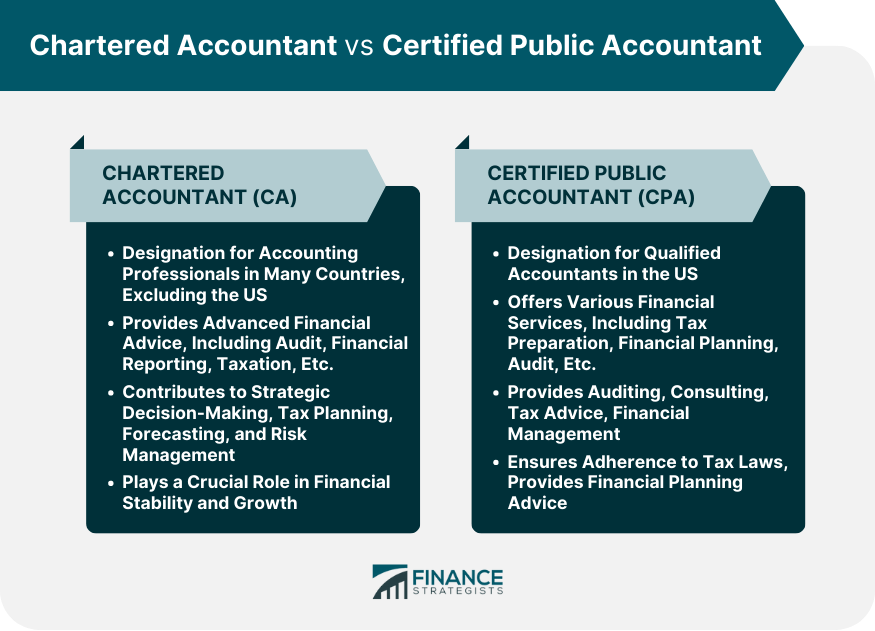
How Chartered Accountants and Certified Public Accountants Work
Key Functions
Certification Process
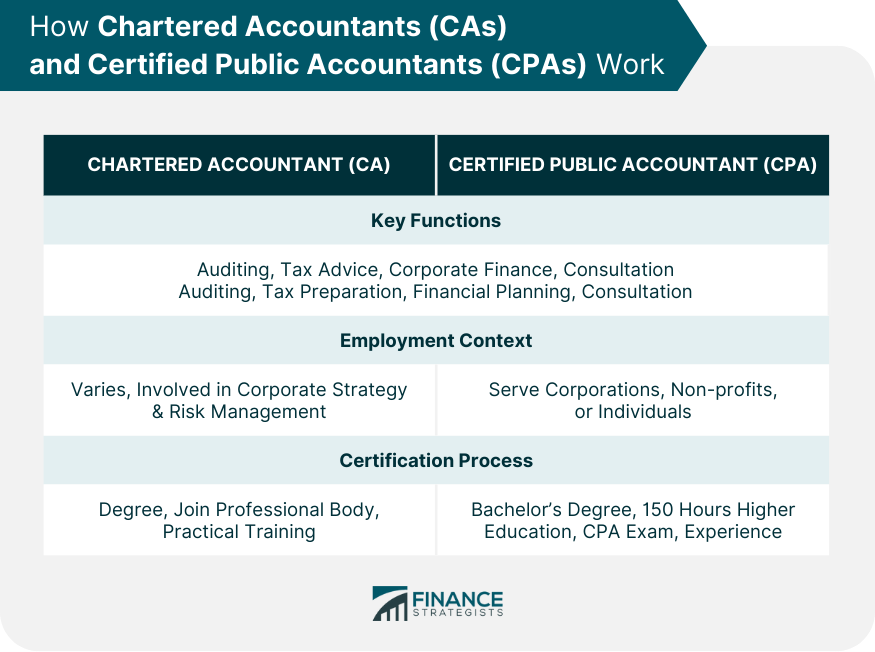
Benefits of Choosing a Chartered Accountant or Certified Public Accountant
Professional Expertise
International Recognition
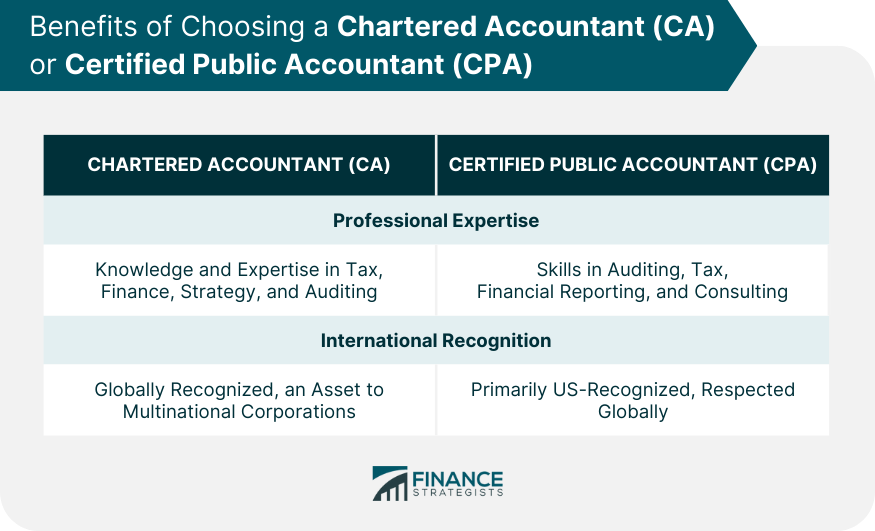
Challenges Faced by Chartered Accountants and Certified Public Accountants
Rigorous Certification Process
Professional Challenges
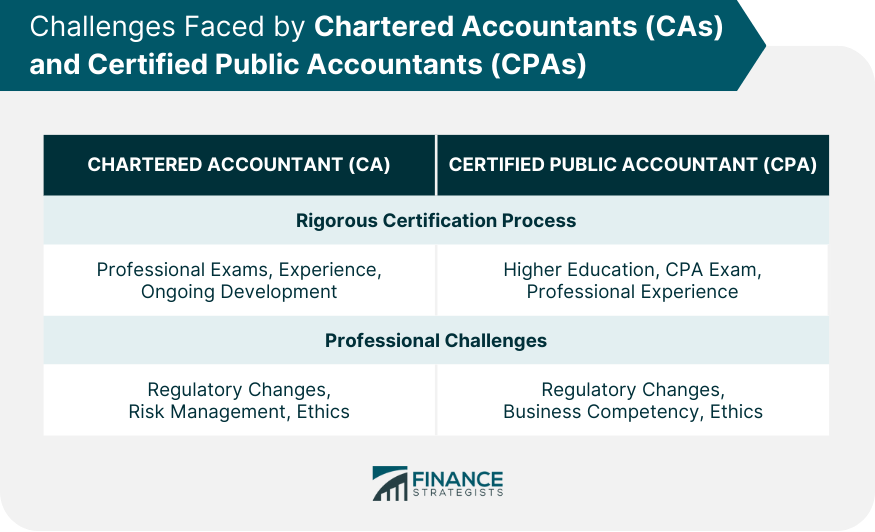
Picking the Right Professional for Financial Needs
Factors to Consider
Making an Informed Decision
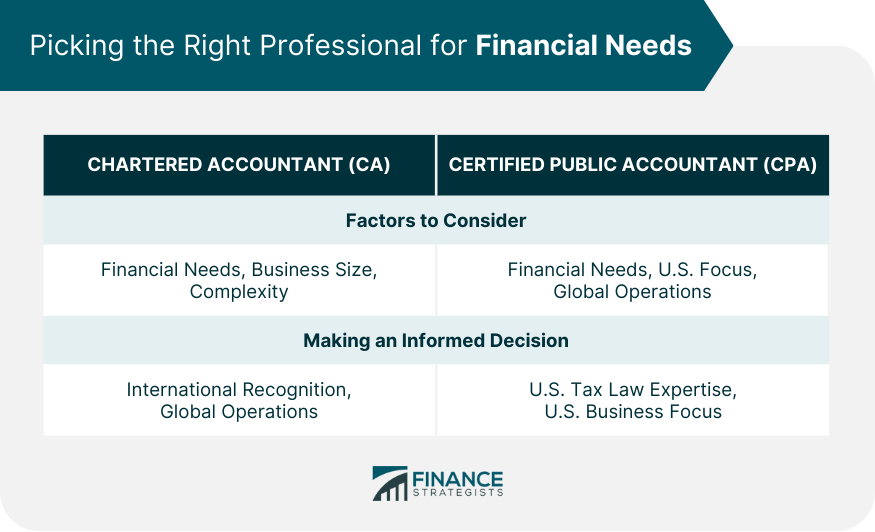
Bottom Line
Chartered Accountant vs Certified Public Accountant FAQs
A Chartered Accountant (CA) is a designation used globally, except in the United States. They have extensive knowledge in areas like audit, financial reporting, taxation, and business strategy. A Certified Public Accountant (CPA), however, is a U.S.-specific designation. CPAs are experts in auditing, tax, financial reporting, and consulting, with a deep understanding of U.S. tax laws and regulations.
Yes, a Chartered Accountant can work in the U.S., and a Certified Public Accountant can work internationally. However, certain restrictions may apply, and they may need to acquire additional certifications or meet specific requirements based on local regulations.
Both Chartered Accountants and Certified Public Accountants face challenges such as staying updated with changes in financial regulations, managing risks, maintaining professional competency, and upholding the highest ethical standards in their practice.
You should consider your business's size, nature, and location, as well as the complexity of your financial transactions. If your business operates globally, a CA might be more suitable due to their international recognition. If you're based in the U.S. and require someone with a deep understanding of U.S. tax laws, a CPA would be a better choice.
Chartered Accountants need to complete a degree, join a professional body, and undergo practical training. The specific process varies by country. Certified Public Accountants need to have a bachelor's degree, complete 150 hours of higher education, pass the Uniform CPA Examination, and gain field experience.
True Tamplin is a published author, public speaker, CEO of UpDigital, and founder of Finance Strategists.
True is a Certified Educator in Personal Finance (CEPF®), author of The Handy Financial Ratios Guide, a member of the Society for Advancing Business Editing and Writing, contributes to his financial education site, Finance Strategists, and has spoken to various financial communities such as the CFA Institute, as well as university students like his Alma mater, Biola University, where he received a bachelor of science in business and data analytics.
To learn more about True, visit his personal website or view his author profiles on Amazon, Nasdaq and Forbes.











